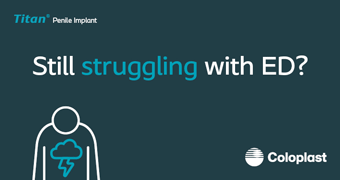The good news
-
Nico_from_belgium
- Posts: 160
- Joined: Wed Apr 09, 2025 4:09 pm
Re: The good news
Dumbest post of the forum.
46 yo, ED since 3 years, tried pills. Venous leakage. Implanted 30/04/25 Pr. Andrianne CHU Liège coloplast titan OTR 20 cm +2 cm rte.
Initial measures ( ved 17.5 cm length, +-16 cm length +- 16 cm girth, 4weeks post-op 16cm length)
Initial measures ( ved 17.5 cm length, +-16 cm length +- 16 cm girth, 4weeks post-op 16cm length)
-
Kodixx

- Posts: 807
- Joined: Wed Jan 08, 2025 5:32 pm
Re: The good news
tooyoung, FWIW, when I decided on an IPP I did my own research, understood the risks and life expectancy issues, and in the end made a decision that was best for myself and my wife. None of that information is new to me, nor does it cause me to regret my decision.
The IPP is known to maximize girth (although there's variability to that). And that increases my wife's enjoyment which is important to me.
The rigidity of the IPP can be adjusted for what's most comfortable and enjoyable for my wife.
The rigidity of the IPP can be adjusted for best sensitivity for me.
Does that make me a "carcass" ? I don't think so.
Does that make me a "carcass praising it's tiger while being eaten" ? Again, I don't think so.
I don't have anything against MPP's. And I'm sure the guys that went that route made their decision based on what was best for them. And I respect that.
- Chuck
The IPP is known to maximize girth (although there's variability to that). And that increases my wife's enjoyment which is important to me.
The rigidity of the IPP can be adjusted for what's most comfortable and enjoyable for my wife.
The rigidity of the IPP can be adjusted for best sensitivity for me.
Does that make me a "carcass" ? I don't think so.
Does that make me a "carcass praising it's tiger while being eaten" ? Again, I don't think so.
I don't have anything against MPP's. And I'm sure the guys that went that route made their decision based on what was best for them. And I respect that.
- Chuck
tooyoung wrote:I can't blame the zookeeper either because it's a fucking tiger..it's a wilderness and not a zoo..FDA regulators are pharma/device companies shareholders....what's more obvious than the studies sponsored by these companies themselves are the studies that are put to action..there's no zookeeper...that's why i blame the carcasses for not running or fighting back...it's the only way out as this system is hardwired...yup it will always be "follow the money"...they will do toyota ipps once carcasses stop being carcasses.... What's strange I've never seen a carcass praising its' tiger while being eaten...so disgusting.
Feb 2025 58yo, 38 w/ greatest wife ever
AMS CX, Tenacio, Dr Broghammer (excellent) pre-op L:7", post-op @ 9 mo L: 6.5=>7.0" G: 5.5=>5.75"
2wks pain, cycling/sex @ 7wks, minor pain until 10wks, felt like 'new normal' sex @ 16wks
AMS CX, Tenacio, Dr Broghammer (excellent) pre-op L:7", post-op @ 9 mo L: 6.5=>7.0" G: 5.5=>5.75"
2wks pain, cycling/sex @ 7wks, minor pain until 10wks, felt like 'new normal' sex @ 16wks
-
Vitalssk
- Posts: 126
- Joined: Sat Jan 04, 2025 9:40 pm
Re: The good news
Corey212 wrote:Vitalssk wrote:lmao i had a 28cm titan coloplast put in me, and i never have any of the looking aroused issues you have had. It literally just looks like i have a huge dick. (which i do) But that never changed for me. Even when i didn't have it installed i had a very prominent bulge.
Also when i squeeze all the fluid out you can barely even tell its there.
It stiff as hell and at the gym not if, or once in a while, but when I did abs it would inflate and it was embarrassing as hell. There's absolutely nothing natural looking of feeling about the Coloplast, except when in the act. Basically I become an exhibitionist and the second I look at someone I become a pervert. Some women may like it but I am already so lit up with anxiety it would never even happen.
And it used to be a lot worse before the perito exercises, and using a stretcher attached to my knee to bend it downward above the dog ears.
That's weird considering the titan has a double lock out so you don't get auto inflation. Ive also done every movement in the gym known to man and have never had a problem with it inflating. Granted you will never get a natural feeling dick when it's not inflated, but again the only time i'm using my dick not inflated is to Piss. Why would i let a woman touch my non inflated dick lol
I think you have some psychological issues if you think everyone you look at thinks your a pervert. Also who gives a shit. I could care less what people think i look like. My dick works and that's really all i care about.
36 year old with 28cm coloplast titan with 125cc Reservoir, lock out with 0 Rear tip extender and pump
Suffered from Combined arterial insufficiency and corporo-venous occlusive erectile dysfunction and Peyronie disease
Had a 35 degree curve
Suffered from Combined arterial insufficiency and corporo-venous occlusive erectile dysfunction and Peyronie disease
Had a 35 degree curve
-
Corey212
- Posts: 61
- Joined: Mon Dec 23, 2019 1:32 am
Re: The good news
Vitalssk wrote:Corey212 wrote:Vitalssk wrote:lmao i had a 28cm titan coloplast put in me, and i never have any of the looking aroused issues you have had. It literally just looks like i have a huge dick. (which i do) But that never changed for me. Even when i didn't have it installed i had a very prominent bulge.
Also when i squeeze all the fluid out you can barely even tell its there.
It stiff as hell and at the gym not if, or once in a while, but when I did abs it would inflate and it was embarrassing as hell. There's absolutely nothing natural looking of feeling about the Coloplast, except when in the act. Basically I become an exhibitionist and the second I look at someone I become a pervert. Some women may like it but I am already so lit up with anxiety it would never even happen.
And it used to be a lot worse before the perito exercises, and using a stretcher attached to my knee to bend it downward above the dog ears.
That's weird considering the titan has a double lock out so you don't get auto inflation. Ive also done every movement in the gym known to man and have never had a problem with it inflating. Granted you will never get a natural feeling dick when it's not inflated, but again the only time i'm using my dick not inflated is to Piss. Why would i let a woman touch my non inflated dick lol
I think you have some psychological issues if you think everyone you look at thinks your a pervert. Also who gives a shit. I could care less what people think i look like. My dick works and that's really all i care about.
I am sorry, but you are wrong. The pump had little to no control on releasing saline. I had to make 5-6 bathroom visits per 1.5 hour workouts. And randomly throughout the the day.
Oh, so I crazy? FUCK YOU!
52; Coloplast Titan (One-Touch) implant on 02/23/2021 by Dr. Karpman
-
duke_cicero

- Posts: 438
- Joined: Tue May 28, 2024 2:58 pm
Re: The good news
This thread is cursed.
Born 1990. ED since age 20 after a bicycle accident. Coloplast Genesis malleable implanted December 2024 by the great Dr. Laurence Levine in Chicago.
· December 2024 implant journal
· June 2025 update
· One-year update
· December 2024 implant journal
· June 2025 update
· One-year update
-
Corey212
- Posts: 61
- Joined: Mon Dec 23, 2019 1:32 am
Re: The good news
duke_cicero wrote:This thread is cursed.
This Implant is a JOKE unless you own and operate a swingers establishment. In the real world you can't be seen every day, day in and day out with a F**king hardon!
52; Coloplast Titan (One-Touch) implant on 02/23/2021 by Dr. Karpman
-
LastHope
- Posts: 1466
- Joined: Sun Feb 18, 2024 1:26 am
Re: The good news
Corey212 wrote:duke_cicero wrote:This thread is cursed.
This Implant is a JOKE unless you own and operate a swingers establishment. In the real world you can't be seen every day, day in and day out with a F**king hardon!
Bro, why don't you get the AMS inflatable? Users report it's a lot more natural compared to Titan.
-
fucked0ne
- Posts: 646
- Joined: Wed Nov 22, 2023 7:47 pm
Re: The good news
duke_cicero wrote:tooyoung wrote:Perito is a con-artist
Proof? Any kind of evidence, here? No? Moving on...tooyoung wrote:as >90% of physicians
More than 90% of physicians are con artists? Again, what proof do you have of this? This is an insane blanket statement that can't be taken seriously.tooyoung wrote:especially penile prosthetic surgeons...because simply if they become otherwise they will instantly loose their jobs
Extraordinary claims require extraordinary evidence. You're saying there's a link between being honest and losing one's job? What's the mechanism, here? This would mean that there's a vast conspiracy of silence and collective malpractice across an entire field. Do you know how fucking insane you sound?
Shit does happen—rarely, tragically, but unavoidably. You may not like that, but medicine isn’t obligated to coddle your fantasies. Get off this forum.
Duke, relax. He’s clearly had a bad experience, so let’s try to keep that in mind. I think what can be extracted from his rant is that it’s not uncommon in a system based on making money for producers and representatives to overstate the benefits (and downplay the weaknesses) of a product in order to make a sale. Anyone who has dealt with hair loss knows this. It’s not that they’re out-and-out lying, only that the primary concern is to make money over any communication of the truth that could potentially hinder that goal.
40. Implanted July 5, 2024, AMS LGX, 21cm cylinders + 2cm RTEs. Idiopathic "hard flaccid" ED following bacterial infection. Tried pulse waves, Cialis, TRT, even spinal injections. Nada.
-
fucked0ne
- Posts: 646
- Joined: Wed Nov 22, 2023 7:47 pm
Re: The good news
Corey212 wrote:tooyoung wrote:Corey212 wrote:No longer appearing sexually aroused around customers that are men, women and children?
Have you fixed your titan or replaced it ?
No, about 3 months ago standing in front of my red light panel I was doing Perito exercises.I felt noting out of the ordinary except the front of my stomach (around pubic area) was constantly nagging for weeks, that I thought maybe cancer or could have been a leak where the saline was irritating that area. My max pumps went from 62 to 47. Then about 5 days ago I was doing perito exercises pushed at the base, middle and towards the tip and felt a pop, and instant deflation. I was able to get 27 pumps for a few days, and then 8-9 and right at the this moment 3 before the bulb deflates.
Never in my life will I ever put a Chloroplast disaster in my body. One of the worst mistakes of my life. I have lost more than money, believe me
What went on it? The tubing?
As a purely unscientific observation, I have noticed that the majority of the breaks on here appear to be Coloplast.
40. Implanted July 5, 2024, AMS LGX, 21cm cylinders + 2cm RTEs. Idiopathic "hard flaccid" ED following bacterial infection. Tried pulse waves, Cialis, TRT, even spinal injections. Nada.
-
Vitalssk
- Posts: 126
- Joined: Sat Jan 04, 2025 9:40 pm
Re: The good news
Corey212 wrote:Vitalssk wrote:Corey212 wrote:
It stiff as hell and at the gym not if, or once in a while, but when I did abs it would inflate and it was embarrassing as hell. There's absolutely nothing natural looking of feeling about the Coloplast, except when in the act. Basically I become an exhibitionist and the second I look at someone I become a pervert. Some women may like it but I am already so lit up with anxiety it would never even happen.
And it used to be a lot worse before the perito exercises, and using a stretcher attached to my knee to bend it downward above the dog ears.
That's weird considering the titan has a double lock out so you don't get auto inflation. Ive also done every movement in the gym known to man and have never had a problem with it inflating. Granted you will never get a natural feeling dick when it's not inflated, but again the only time i'm using my dick not inflated is to Piss. Why would i let a woman touch my non inflated dick lol
I think you have some psychological issues if you think everyone you look at thinks your a pervert. Also who gives a shit. I could care less what people think i look like. My dick works and that's really all i care about.
I am sorry, but you are wrong. The pump had little to no control on releasing saline. I had to make 5-6 bathroom visits per 1.5 hour workouts. And randomly throughout the the day.
Oh, so I crazy? FUCK YOU!
yeah bro, you're crazy. If it was so bad you would've had a revision surgery to put a malleable or another company implant in. Instead you made a post crying about how it was so terrible but you decided to live with it but it was so horrible.
Also yes the only thing that controls pulling the saline into the implant is the pump. So if i was in your position, the first thing i would have done was gone back to the doctor who did my surgery and try to find a resolution.
instead you came on here whining worse than a 16 year old school girl.
You need a psychiatrist, a therapist, and maybe even some hormones for the issues you are having.
and you do realize the coloplast has a 10 year warranty right? So it would have been covered if something was actually wrong with it. Which i doubt there was.
36 year old with 28cm coloplast titan with 125cc Reservoir, lock out with 0 Rear tip extender and pump
Suffered from Combined arterial insufficiency and corporo-venous occlusive erectile dysfunction and Peyronie disease
Had a 35 degree curve
Suffered from Combined arterial insufficiency and corporo-venous occlusive erectile dysfunction and Peyronie disease
Had a 35 degree curve
Who is online
Users browsing this forum: amazonbot, DotBot and 119 guests








